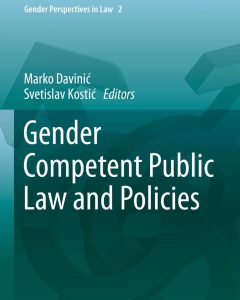The implementation of LAWGEM project has led to the publication of books of great importance not only for teaching staff, but also for legal practitioners, students, as well as anyone else interested in acquiring a better understanding of contemporary gender competent legal questions.
This also relates to the books published by Springer, in the frame of book series ‘Gender Perspectives in Law’, edited by Prof. Dr. Dragica Vujadinović and Prof. Dr. Ivana Krstić. The book series represents the added value to the LAWGEM project and which discusses all-encompassing gender-competent legal questions. Having a gender-competent approach is required when considering the highest values and normative standards of modern international, European, and national law. Raising awareness about gender equality issues means investing in the creation, interpretation, and implementation of legislation that is more fair, just, and equitable and will also contribute to a comprehensive understanding of social reality, as well as to gender-competent political, legal and economic decision-making and public policies.
The second book published within the series is the book edited by Marko Davinić and Svetislav Kostić Gender Competent Public Law and Policies (Springer Nature, Cham, 2022, XVI + 150 pages). It offers a new perspective on public law and public policies, begining with discussion on gender perspectives in constitutional law, which can support gender justice, but also perpetuate patriarchal norms. The book then analyzes the role of the European Ombudsman in the area of gender discrimination.
Despite its limited jurisdiction, this institution has become a significant complementary tool in the protection of gender equality and the elimination of gender discrimination at the EU level. Particular attention is paid to the importance of mainstreaming gender into public policies. Thus, the legal and institutional frameworks of Spain and Serbia are presented, which can serve as an inspiration to other countries. Another important aspect covered in the book is an analysis of systemic differences between the average wages of women and men in the six countries of the Western Balkans. In turn, the book presents a discussion on female genital mutilation as a highly gendered crime based on extreme versions of rigid, patriarchal ethnic and religious norms and customs. It is analyzed through the lenses of the Istanbul Convention, as a tool for combating violence against women. Particular attention is paid to femicide, its definitions, forms, and phenomenological characteristics. Having been only recently acknowledged, femicide is still characterized by an inadequate judicial response in many countries. In this regard, a special focus is on German and Serbian experiences in acknowledging femicide and combating it through various measures. Finally, the importance of stalking laws is discussed, as stalking is a highly gendered crime that many states fail to combat adequately. The collection of essays offered in this book will be of interest to all those working in the field of public law, to policymakers, and to students and academics looking to broaden and deepen their research on various issues in public law and policies from gender perspectives.
You can access the book by clicking this link:
https://link.springer.com/book/10.1007/978-3-031-14706-7


